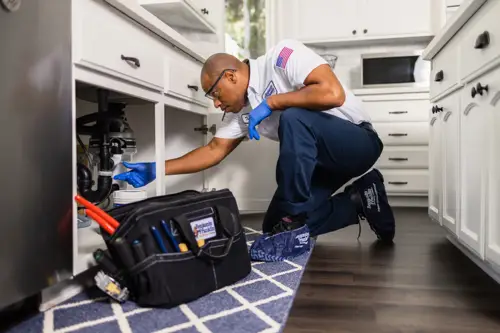 Hard water can wreak havoc on pipes, appliances, and other items throughout your house. In addition, it can lead to dry skin, itchy hair, or clothes that don’t feel like they are clean. Fortunately, there is an easy way to test for hard water so that you can avoid these and other issues in the future.
Hard water can wreak havoc on pipes, appliances, and other items throughout your house. In addition, it can lead to dry skin, itchy hair, or clothes that don’t feel like they are clean. Fortunately, there is an easy way to test for hard water so that you can avoid these and other issues in the future.
Testing With Strips
The first primary method of testing for hard water includes the use of strips that can be purchased online for a few dollars. The strip goes inside a small sample of water and remains there for a minute or two. After you remove the strip from the water, it will change color. You can then compare the color of the strip to the key on the box it came in to determine what’s in your water and whether it needs to be softened.
The Soap and Water Method
You can also test for hard water by mixing a jar of water with a bit of dish soap. If you see a strong layer of foam on top of the water, it is likely devoid of calcium or sediment. However, if you see only minimal foam at the surface and cloudy water underneath it, you likely have hard water.
Work With a Water Quality Company
It may be possible to partner with a water quality service provider to turn your hard water into something softer and easier to manage. A service provider may be able to conduct tests and install a softening system if necessary.
Get in Touch with Your Local Water Provider
Another option is to get in touch with the local water utility to request a water quality analysis. This should tell you whether there is sediment in your water as well as reveal the presence of other chemicals or impurities that a water softening system might be able to mitigate. It’s worth noting that your local utility provider won’t install softening systems or take any other steps beyond providing an initial analysis.
Measuring Hard Water
Hard water may be measured in grains per gallon (GPG), and anything more than seven GPG indicates the presence of hard water. If a test shows more than 10 GPG, you have extremely hard water. Your test may also measure water hardness in parts per million (PMP) or milligrams per liter (mg/L). If this is the case, you can simply divide the number shown on your test by 17.1 to get your GPG.
Call Benjamin Franklin Plumbing for Help Today
At Benjamin Franklin Plumbing, we can help you get softer water in a timely manner. We can also help you fix any plumbing issues that hard water might cause such as broken pipes or sediment buildup in your water heater.